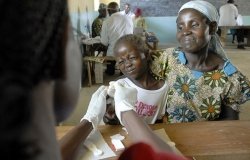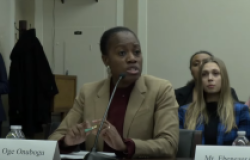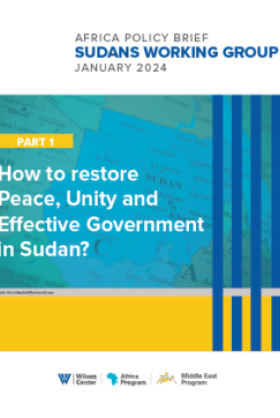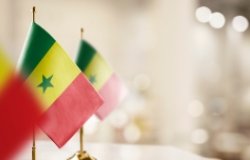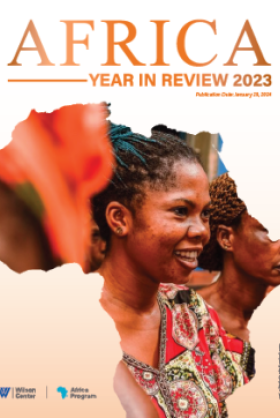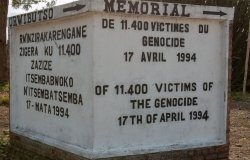Nigeria-U.S. partnership for the promotionof Democracy, Peace and Development in Africa
With His Excellency Chief Ojo Maduekwe, Nigerian Minister of Foreign Affairs Peter Lewis, Associate Professor; Director of African Studies Program, Johns Hopkins University SAIS will moderate.
Overview
Opening the discussion on Nigerian-US partnerships, Peter Lewis, Director of African Studies at SAIS, pointed out that Nigerian Foreign Minister Ojo Maduekwe speaks at a very propitious moment for Nigeria and US-Nigerian relations. Not only is there a new US administration but also a new Assistant Secretary of State for Africa, which opens the window to address a number of pressures and important issues in terms of Nigeria-US relations. Nigeria plays a major role in peacekeeping, conflict management, and mediation on the African Continent, especially in West Africa and Darfur, and its engagement in international peacekeeping is essential. It is a major oil producer and exporter; Nigerian decisions loom large in global oil market and concerns over instability in the Niger Delta and their international and regional reverberation are a basis for common discussion and dialogue. In the context of the global economic downturn, Nigeria, which has had a well managed economy over the last several years, will face challenges along with other countries in Africa and in the world, Lewis said. Oil prices fell to $40/barrel from their peak at $147 last July, threatening revenue pressures for Nigeria. External reserves, while still quite strong and robust, are decreasing considerably, which could lead to the need for international support. Lastly, there are at least one million Nigerians living in the US, Lewis said. They cut across all sectors of society: academia, finance, journalism, engineering etc. They are a lively, vibrant and prominent community in the US. With a new US administration and a still relatively new Nigerian administration talking about both African issues and the potential to accentuate existing bilateral relationships, it is especially important to engage the expatriate and Diaspora communities.
Foreign Minister Ojo Maduekwe
Minister Maduekwe opened by recalling President Obama's inaugural speech: "The time has come to let aside childish things", inviting Nigeria and the United States to turn a page on their manifest weaknesses. It is time to choose, again in the words of President Obama, "our better History", Minister Maduekwe said. It is time for greater imagination, vision, courage and commitment to the endless possibilities in relations between Nigeria, Africa's largest democracy, and the US, the world's most powerful democracy. Being the older of two still very young nations, the US should take Nigeria along as a sibling, fostering a protective relationship. The simple message the Minister brought to Washington is that a strong Nigeria is critical to a strong Africa. And a strong Africa is crucial not only for peace and security for a continent that is currently plagued by intense violence, but also for a continent where problems are often confronted outside the confines of its geographical borders.
A new partnership with a new Africa
Nigeria and the US need to speak the language of partnership rather than of paternalism. The new administration has the capacity to engage on those terms and Nigeria is ready for it, Minister Maduekwe said. The continent is no longer a hungry man waiting to be fed. Africa is ready to work, and to move from a relationship of aid or charity to one of partnership. Nigeria wants the New Africa to be seen as an Africa with voices, eager to distinguish between its true friends and likely new predators. Africa thus needs eyes to make these distinctions and Nigeria, by its location, size, markets, resource endowment, and the vitality of its institutions and peoples, remains the ideal destination. Nigeria cannot be safe if the rest of the continent is neither safe nor secure; Nigeria cannot prosper if the rest of the continent does not prosper, the Minister said. Hence, the participation of Nigeria in peacekeeping operations on the continent is essential. The Foreign Minister did not come to DC to lament; he came to urge action on mutual strength. The continent of Obama's father is ready to move away from a "yes we cry" mood to a "yes we can" profile.
Recognizing Nigeria's Achievements
Minister Maduekwe encouraged the US to recognize Nigeria's achievements. The psychological concept of positive reinforcement does not only apply to children who need to develop considerable self esteem to be responsible and effective adults. It also applies to young nations, fragile democracies, fragile markets, and to systems still fighting corruption and primordial methods of accumulation, to nations whose boundaries were determined by the colonial experience, he said. Nation building and regional integration remain a challenge and there is a need to engage in positive reinforcement to encourage these nations to know that the future is promising.
A national consensus on the fight against corruption has been reached in Nigeria and needs to be acknowledged. This consensus is critical for the survival of Nigeria, a country with 127 million inhabitants and about 200 ethnicities. The Minister mentioned the unfortunate reverse of the country's economic base as a source of corruption. A consensus has emerged in Nigeria on the fact that oil is not an inexhaustible resource and the development of Nigeria cannot be based solely on its extraction. Ending corruption and stopping the mismanagement of resources is crucial, however, Nigeria does not want to be told who should or should not head the anti-corruption agency. Instead, Nigeria needs to engage in a discussion about institutional capacity building and the implications of rule of law in the fight against corruption. Advice about solutions is welcomed, not lectures, he said.
The Nigerian government has taken the Goldman Sachs prediction that Nigeria could become one of the twenty leading economies by the year 2020 seriously, and has designed a commensurate economic blueprint. The USA should take credit by partnering with Nigeria in that direction.
The Minister also highlighted the success story of the Nigerian transition. The country achieved a democratic transition from one elected civilian government to another. A success that involved change of personalities he said. He sees Nigeria and the US as sharing a similar history; the US also experienced challenges and obstacles in the foundation of its democracy. He recalled Nigeria's firm commitment on democratic consolidation, noting that it is being achieved with respect to freedom, tolerance and diversity of religions.
Electoral reforms to achieve more transparent processes are fundamental to the survival of Nigeria. Unprecedented and very progressive decisions have been made. The right to contest elections, even presidential ones, and the creation of an independent electoral commission are both essential to transparent and democratic elections. According to the charter of the electoral commission, the members - including the chairman - are appointed by the president. Minister Maduekwe argued that if the President is good enough to appoint the chief Justice of the country and the judges of the Supreme Court, he is qualified to appoint the chairman of the Electoral Commission. He said that the independence of the Commission is not affected by who appoints its members, but more by the integrity and character of those who are appointed, underlining the high level of integrity in Judiciary top officials.
International Engagement and Cooperation
With respect to political changes in other African countries, it is Nigerian policy, as in the United States, that no government that attains power without a democratic constitutional process will be recognized. Over the past few months, the sub-continent has experienced democratic reversal in both Mauritania and in Guinea-Conakry. Nigeria has been very firm in condemning these unconstitutional changes and has asked for sanctions. Of important concern to the US government is the political will of Nigeria to take the necessary actions against the complete collapse of countries like Guinea Bissau. Nigeria has a long history of participation in Peacekeeping Operations in countries such as the Democratic Republic of Congo or Liberia and intends to remain supportive of conflict resolution across the continent. Nigeria intends to remain very active and responsible in international affairs as a member of ECOWAS and the AU. Nigeria is also asking the US what its potential role in Somalia could be if the "bad guys" from Afghanistan were to move there. These democratic reversals arrive at a time when the market economy is in retreat. The juxtaposition of democracy and a market economy pushed by the US for a long time might now be under enormous stress in the context of the global economic crisis. This evokes the ideas of synergy, State capacity and the role of the US in helping economies like Nigeria to consolidate and remain strong. The global economic downturn cannot be the excuse for democratic reversal, Minister Madwakwe concluded, but must be a catalyst for increased cooperation and partnership between countries.
Hosted By

Africa Program
The Africa Program works to address the most critical issues facing Africa and US-Africa relations, build mutually beneficial US-Africa relations, and enhance knowledge and understanding about Africa in the United States. The Program achieves its mission through in-depth research and analyses, public discussion, working groups, and briefings that bring together policymakers, practitioners, and subject matter experts to analyze and offer practical options for tackling key challenges in Africa and in US-Africa relations. Read more
Thank you for your interest in this event. Please send any feedback or questions to our Events staff.




